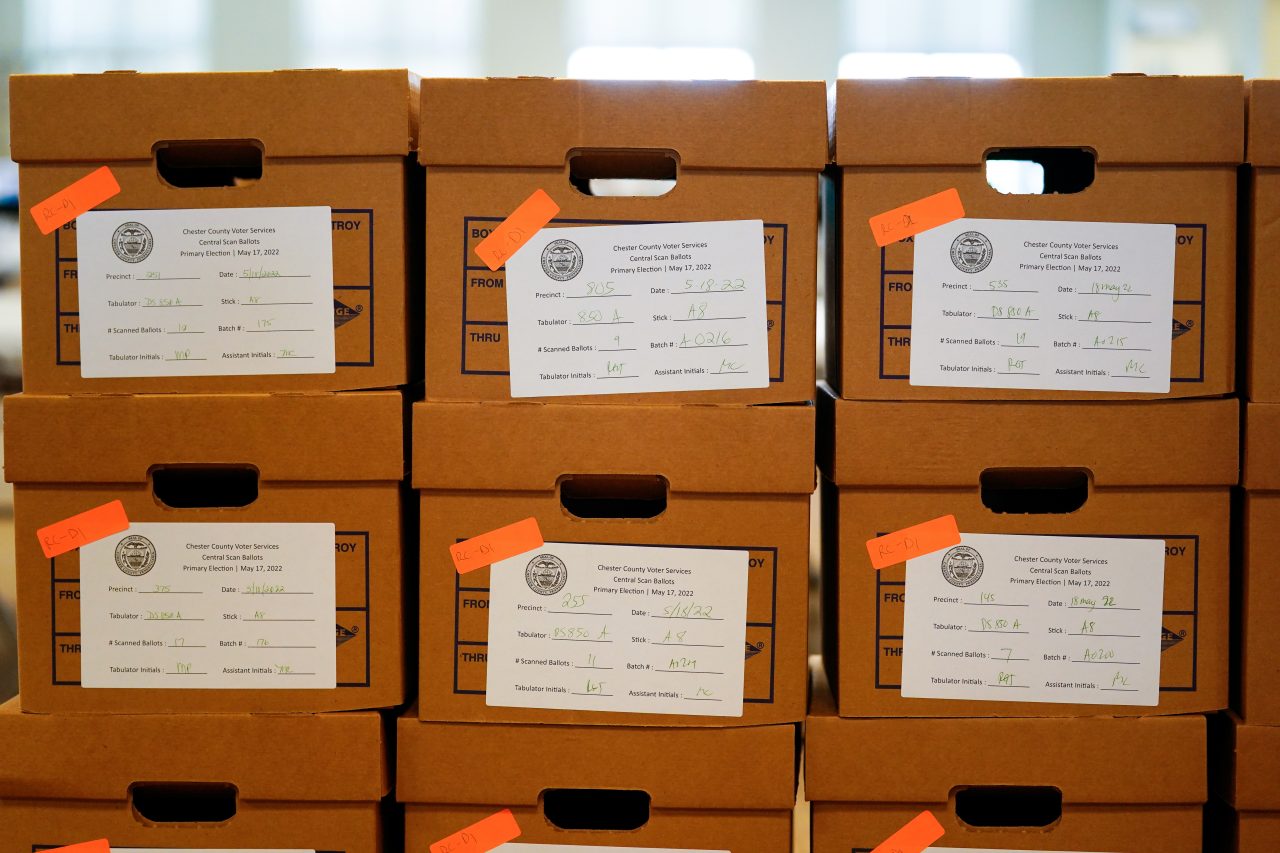
Election workers perform a recount of ballots from the recent Pennsylvania primary election at the Allegheny County Election Division warehouse on the Northside of Pittsburgh, June 1, 2022.
Gene J. Puskar / AP

Election workers perform a recount of ballots from the recent Pennsylvania primary election at the Allegheny County Election Division warehouse on the Northside of Pittsburgh, June 1, 2022.
Gene J. Puskar / AP

Gene J. Puskar / AP
Election workers perform a recount of ballots from the recent Pennsylvania primary election at the Allegheny County Election Division warehouse on the Northside of Pittsburgh, June 1, 2022.
Ahead of the Nov. 8 midterms, a trio of election law changes are moving forward in the Pennsylvania House.
Under one, election workers would have to place marked ballots in sealed containers – and write down any instance in which those seals are broken. Another would require counties to purge dead people from the voter rolls each month. Write-in candidates would have to file financial disclosure forms under a third.
Lawmakers of the powerful House State Government committee supported each of those ideas almost unanimously Monday. Only four Democrats voted against Rep. Russ Diamond’s (R-Lebanon) voter roll cleanup measure.
Diamond said he wasn’t surprised.
“I think it’s acknowledged that we have a problem with keeping our voter rolls clean and precise, so any effort we do, I think, is going to get bipartisan support,” he said.
A conservative law group known as the Public Interest Legal Foundation sued Pennsylvania before the 2020 election, claiming more than 20,000 people had been on the rolls for years after their deaths.
The legal group never proved their claim. A federal judge that heard arguments in the case called it “ill-framed and speculative,” and found the data PILF lawyers used was unreliable. But when the case was settled last year, the Department of State promised to make sure all dead voters were removed before the November 2021 election.
Some Republican lawmakers support more frequent voter roll purges as a way of combating potential voter fraud. However, only one voter out of nearly 3 million used a dead person’s name to cast a mail-in ballot during the 2020 election.
Diamond as well as Rep. Frank Ryan (R-Lebanon) falsely insinuated that more ballots were counted in the presidential race that year than the number of voters who turned out. The claim was debunked after the Department of State pointed out that it relied on incomplete voter data.
Rep. Gary Day (R-Lehigh) is behind the proposal to mandate ballot storage in sealed containers. He argued the state’s ballot chain-of-custody procedures should mirror those in the business world.
“When I was 18 years old working in a drugstore, you had to keep track of everything through a cargo securement [process],” Day said. “I think it’s important that we should try to bring that to the ballot-counting procedure.”
Some election departments already seal ballots after an election and keep written tabs on them, but supporters stress the change would require all counties to follow that process.

Matt Rouke / AP Photo
Boxes of recounted ballots from the recent Pennsylvania primary election are stacked at the Chester County Voter Services office in West Chester, Pa., Wednesday, June 1, 2022.
Rich Garella, who heads up the voter advocacy and watchdog group Protect Our Vote Philly, said the measure would help make ballot handling more transparent. But adding consequences for not following the rule, he said, would make the bill even better.
“[A] Board of Election could be required to acknowledge and report on each instance, officially at its public meeting, and vote about what to do,” Garella said. “Otherwise, all this sealing is just for show.”
Even if his bill becomes law before the midterms, Day said it wouldn’t take effect for another two months – meaning next May’s primary is the earliest election under which the rules would apply.
“The idea is to make the system secure, not to just affect one election,” Day said.
Under the other bill from Rep. Lori Mizgorski (R-Allegheny), write-in candidates for public office would have to file what are known as Statements of Financial Interest. They’re designed to let the State Ethics Commission know whether a candidate has any financial stake in something that might conflict with their public duties.
“If those of us that go out and get signatures and get on the ballot have to follow those rules, then those who get on the ballot as a write-in should have to follow them,” Mizgorski said.
To advance any further, all three measures would have to be voted on by the full House. Republicans who control the chamber would not say when it would hold those votes.

Sometimes, your mornings are just too busy to catch the news beyond a headline or two. Don’t worry. The Morning Agenda has got your back. Each weekday morning, host Tim Lambert will keep you informed, amused, enlightened and up-to-date on what’s happening in central Pennsylvania and the rest of this great commonwealth.
The days of journalism’s one-way street of simply producing stories for the public have long been over. Now, it’s time to find better ways to interact with you and ensure we meet your high standards of what a credible media organization should be.